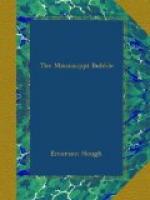Lady Catharine had left her carriage before this interchange, and had passed the prison gate alone. Her steps faltered. It was hardly consciously that she finally found her way into the court, through the gate, down the evil-smelling corridors, past the sodden and leering constables, up to the last gate which separated her from him whom she had come to see.
She had been admitted without demur as far as this point, and even now her coming seemed not altogether a matter of surprise. The burly turnkey at the last door stood ready to meet her. With loud commands, he drove out of the corridor the crowd of prison attendants. He approached Lady Catharine, hat in hand and bowing deeply.
“I presume you are the man whom I would see,” said she, faintly, almost unequal to the task imposed upon her.
“Aye, Madam, I doubt not, with my best worship for you.”
“I was to come”—said Lady Catharine. “I was to speak to you—”
“Aye,” replied the turnkey. “You were to come, and you were to speak. And now, what were you to say to me? Was there no given word?”
“There was such a word,” she said. “You will understand. It is in the matter of Mr. Law.”
“True,” said the turnkey. “But I must have the countersign. There are heads to lose in this, yours and mine, if there be mistake.”
Lady Catharine raised her head proudly. “It was for Faith,” said she, “for Love, and for Hope! These were the words.”
Saying which, as though she had called to her aid the last atom of her strength, she staggered back and half fell against the wall near the inner gate. The rude jailer sprang forward to steady her.
“Yes, yes,” he whispered, eagerly. “’Tis all proper. Those be the words. Pray you, have courage, lady.”
There came into the corridor a murmur of voices, and there was audible also the sound of a man’s footfalls approaching along the flags. Catharine Knollys looked through the bars of the gate which the turnkey was already beginning to throw open for her. She looked, and there appeared upon her vision, a sight which caused her heart to stop, which confounded all her reason. From a side door there advanced John Law, magnificently clad, walking now as though he trod the floor of some great hall or banquet room.
The woman waiting without the gate reached out her arms. She would have cried aloud. Then she fell back against the wall, whereat had she not grasped she must have sunk down to the floor.
Upon the arm of John Law, and looking up to him as she walked, there hung the clinging figure of a woman, half-hidden by the flickering shadows of the torches. A deep cloak fell back from her shoulders. It might have been the light fabric of the aborigine. Upon the foot of Mary Connynge, twinkling in and out as she walked, showed the crudely garnished little shoe of the Indian princess over seas, dainty, bizarre, singular, covering the smallest foot in all London town.




